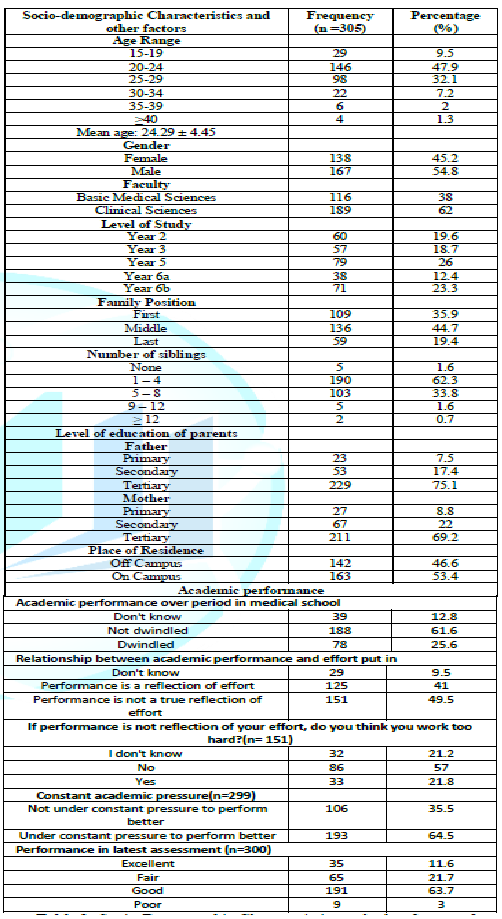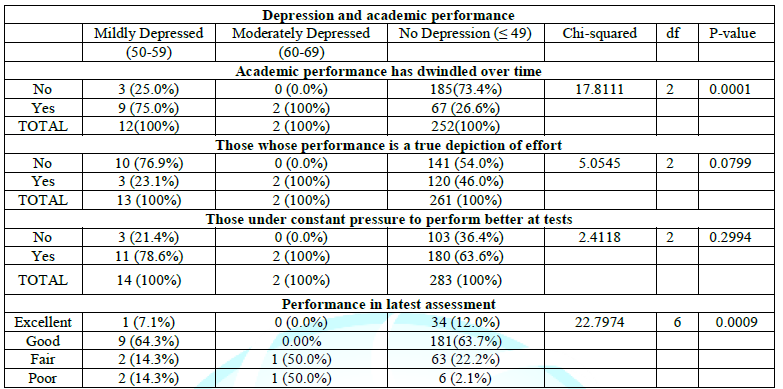Introduction
The burden of depression and other mental health conditions is on the rise globally [1], among all age groups including medical students among whom it has continued to constitute enormous concern, often associated with poor academic performance, disability and poor quality of life [2-6]. Depression is a leading contributor to the global burden of disease and is a common illness with an estimated 350 million people affected worldwide [1]. The World Mental Health Survey conducted in 17 countries found that an average of 1 in 20 people reported having an episode of depression in the previous year [2]. Prevalence rates of depression vary by country and by region with highest rates in Afghanistan and lowest in Japan [3]. A medical school is a tertiary educational institution – or part of such an institution that teaches medicine, and awards a professional degree that qualifies one to practice medicine. Although there are several medical schools in Nigeria, gaining entrance and/or finishing from them is highly competitive and demanding respectively. It has been found that medical students have a higher level of depression than their colleagues in other departments as seen in studies carried out [7-9].
Depression
has been associated with cognitive impairment and may impair academic
performance. Depression is a common disorder that impacts an individual’s
ability to perform life activities [10]. It therefore comes as no surprise that
the depressed medical student performs abysmally; because they lack
self-motivation which is the key ingredient for success. A student who has
consistently performed poorly over a period of time gets depressed, losing the
self-motivation that should have spurred him to try again, further gets
depressed, gives up, feels worthless and academic performance worsens further
and so continues the vicious cycle until the student is at the lowest ebb of
depression.
Aim
To
determine the relationship between depression and academic performance among
medical students in the University of Port Harcourt.
Methodology
This
study was a descriptive cross-sectional study. Appropriate sample size was
calculated and the stratified random sampling method was used to select the
subjects from all the classes except first year which was considered not a true
medical class and fourth year because there were no medical students in the
class as at the time of the study. A well structured open ended
self-administered socio-demographic questionnaire was administered to the
students. The Zung Self Rated Depression Scale was used to assess the
depression status of each respondent in conjunction with the Diagnostic
Statistical Manual, Version Five (DSM V). Depressive illness was then
correlated with academic performance of the students. The data were analysed
using descriptive and analytical methods.
Limitation
Industrial
actions in the university and hospital affected the continuity of the study.
The sample size was too small and the study is a cross-sectional type, hence,
inadequate for the determination of association between depression and
aforementioned factors.
Results
The
prevalence of depression among the medical students was 5.3%. Fourteen students
(4.6%) were mildly depressed while only two respondents had moderate
depression. Year 3 had the highest prevalence with 10.5% followed by final year
with 5.3%, while the only 2 cases of moderate depression were found among
students in year 2 of their medical programme. Academic performance was
generally poor among the medical students with depressive illness compared to
those without depressive illness and academic performance was worse with
increasing severity of depression.
Socio-demographic
characteristics of respondents
Respondents within the age group of 20-24 constituted the largest percentage with 146 (47.9%), followed by the age group of 25-29 with 98 (32.1%) while that of 35-39 was the least with 4 (1.3%) (Table 1). Majority of the respondents were clinical students, constituting about 189 (62.0%) with the highest proportion of respondents belonging to the year 5 class: 79 (26.0%) (Table 2).
Discussion
A study among undergraduate medical students in the United States of America found that 23% of the students had clinical depression [6] and it was similar to the study conducted in the University of Nigeria Teaching Hospital, Enugu Campus which put the prevalence of depression among medical students at 23.3% [7]. When compared with a study done by Adewuya et al. on depression among undergraduate students in universities in Western Nigeria targeting 1206 nonmedical students found that 8.3% of the students met the criteria for major depressive disorder showing that depression rates are much higher among medical undergraduates compared with their nonmedical counterparts [8].

Table 1: Socio-Demographic Characteristics and other factors of respondents.

Table 2: Academic factors which could lead to depression.
In
our study, the prevalence of depression among medical students in the
University of Port Harcourt was 5.3%, with mild depression 4.6%, moderate
depression 0.7% and there were no respondents found with severe depression.
This did not agree with the study done on Mental Depression and coping
strategies among medical students in the University of Nigeria, Enugu Campus by
Nwobi in 2009, which put the prevalence of mild depression at 27.6%, moderate
depression at 8.9% and severe depression 1.6% [11]. It also differed from the
study done by Aniebue et al. also in
the University of Nigeria, Enugu Campus which put the prevalence of depression
at 23.3% [7]. It also differs from findings in other parts of the world which
put the prevalence of depression among medical students between 21-39% [9,12-15].
Possible
reasons for this disparity in findings between our study and others already
done may be that our respondents possibly were not very honest with information
provided in the questionnaires, they have better coping mechanisms and social
support structures as most of our respondents have parents who live together.
Also, the low prevalence of depression found could also be due to the fact that our study was done at a time when access to the internet, social media and other forms of relaxation are easier to access. Information is just a click away from the average medical student, the volume of work to be studied is available as soft copy on smart phones and the availability of e-library in the institution of study, thus helping to reduce the burden of learning on the medical student. This was different from what was obtainable a decade ago. Majority of our respondents who were found to be depressed were female and there were more students found to be depressed in the lower classes (basic medical sciences), though these factors were not statistically significant. However, in our study, most of those found to be depressed fell into the age bracket of 25 to 29 years with a lower level of depression among the very young (15 -19 years) and those greater than 30years. In our study, there was no established relationship between depression and other factors like having mother alive respondents living alone, if respondents were living on or off campus, if they were coerced into studying medicine and if they had lost any close friends or relatives in the last two years.
Academic
performance is influenced by mental health, financial background and age. In
this study, it was observed that 78 (25.6%) of the respondents admitted that
their academic performance has dwindled, while admitted that their performance
is not a reflection of efforts put in to academic study. A total of 193 (69.4%)
respondents reported being under constant pressure to perform better. A total
of 16 respondents met the criteria for depression. Previous studies found that
depression was a form of mental health problem, which interferes with daily
life functioning and causes emotional pain to the affected individual as well
as the people around him [16,17]. University medical students face many
problems such as prolonged separation from their families, entrance into a new
environment, academic pressures occasion by programme policies like withdrawal
after certain number of examination attempts and period of stay, and adaption
to educational standards [16,17]. These cumulatively predispose them to having
psychological problems particularly depression and anxiety [16,17].
Conclusion
Depression
remains a major cause of morbidity and reduced productivity the world over. It
is closely associated with anxiety and stressful conditions. Depression was
found to correlate positively with reduced academic performance. Efforts should
be put in place to reduced stress, anxiety and depression and encourage healthy
living among our future doctors.
Recommendations
·
It
is needful for the school authorities, student bodies, religious associations
and families to be aware of the risks of depression and continually reach out
to, and provide loving support and encouragement for those living with
depression.
· The
student-advisor-mentorship structure should be improved upon so that students
may be able to relate their academic challenges to their mentors, who in turn
can offer solutions to them.
· Students should be encouraged to pursue extracurricular activities of interest to help ease off the stress of medical training.
References
- CMHC UT
Counselling and Mental Health Centre, Division of Student Affairs; Depression.
University of Texas, Austin; 2015.
- Oxford
Advanced Learners Dictionary. 7th Ed (2005) Oxford University Press, USA.
- Ahuja
N., Ahuja S. A short textbook of psychiatry. 7th Ed (2011) Jaypee Brothers
Medical Publishers New Delhi, India.
- World
Health Organisation. Media centre; Depression 2012.
- Marcus
M, Yasamy M, van Ommeren M, Chisholm D, Saxena S. Depression - A Global Public
Health Concern (2012) WHO Department of Mental Health and Substance Abuse 6-8.
- Ferrari
AJ, Charlson FJ, Norman RE, Patten SB, Freedman G. Burden of Depressive
Disorders by Country, Sex, Age, and Year: Findings from the Global Burden of
Disease Study (2010) PLoS Med 10: e1001547. doi: 10.1371/journal.pmed.1001547
- World
Health Organisation. Mental Health; Suicide Data 2012.
- American
Foundation for Suicide Prevention. Physician and Medical Student Depression and
Suicide Prevention. 2016.
- Sherina
MS, Rampal I, Kaneson N. Psychological stress among undergraduate medical
students (2004) Med J Malaysia 59: 207-211.
- Aniebue
PN, Onyema GO. Prevalence of depressive symptoms among Nigerian medical
undergraduates (2008) Trop Doct 38: 157-158.
- AdewuyaA
O, Ola B A, Aloba O. Depression amongst Nigerian University Students;
Prevalence and sociodemographic correlates. Soc Psychiat Epidemiol 41: 674.
doi: 10.1007/s00127-006-0068-9.
- Depression
(major depressive disorder).
- World Health
Organisation. Health topics: Depression 2016.
- Sidana S, Kishore J, Ghosh V, et al. Prevalence of depression in students of a medical college in New Delhi: A cross-sectional study (2012) AMJ 5: 247 -250. http://dx.doi.org/10.4066/AMJ.2012.750
- Zoccolillo
M, Murphy GE, Wetzel RD. Depression among medical students. J Affect Disord.
1986; 11: 91-96.
- Fawzy
M, Hamed SA. Prevalence of psychological stress, depression and anxiety among
medical students in Egypt (2017) Psychiatry Res 255:186-94.
- Mahroon ZA, Borgan SM, Kamel C, Maddison W, Royston M, Donnellan C. Factors associated with depression and anxiety symptoms among medical students in Bahrain (2018) Acad Psychiatry 42: 31–40.
*Corresponding author: Nkporbu A Kennedy, Department of Preventive and Social Medicine, University of Port Harcourt, Nigeria, Email: nakpigi2008@yahoo.com
Citation: Asuquo E, Nkporbu AK, Okechukwu C, Onoh I and Okafor T. Correlation of depressive illness with academic performance among medical students at the university of port harcourt (2020) Edelweiss Psyi Open Access 4: 18-21.
Keywords
Depression, Academic performance, Medical students, Uniport..


 PDF
PDF